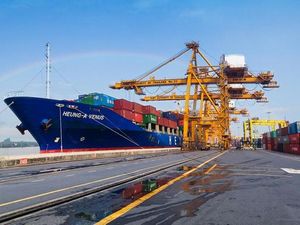The Lebanese President Salam has reaffirmed Lebanon's commitment to fully adhere to United Nations Resolution 1701 and the associated security arrangements, emphasizing the importance of state authority in the country. This declaration comes as the Lebanese army continues its operations and expands its deployment across southern Lebanon and other regions, aiming to reinforce the state's control over arms and maintain peace.
In a statement reported by Lebanon 24, President Salam emphasized the necessity of consolidating state power, particularly in light of ongoing challenges to national sovereignty. He stated, "Lebanon is committed to the provisions of Resolution 1701 completely and to security arrangements, and the army continues its work and expands its deployment in the south, as in other Lebanese territories, to extend the state's authority and control weapons." This commitment is seen as vital in ensuring that arms are monopolized by the state, thereby reducing the potential for sectarian strife and violence.
The Lebanese army has been actively engaging in operations to extend its presence and authority across various regions, particularly in the south, where tensions have historically been high. The army's expansion is not only a show of force but also a strategic move to solidify the Lebanese government's control, which has been challenged by various non-state actors.
In addition to the military's role, President Salam's administration is also focused on preventing any actions that might incite sectarian conflict. The government has urged all parties to refrain from actions that could exacerbate divisions within society. The statement from the presidency also highlighted the importance of maintaining the dignity of all citizens, particularly those affected by past conflicts.
Meanwhile, in a related development, the Syrian Presidency has expressed significant concerns regarding the actions of the Syrian Democratic Forces (QSD) in northeastern Syria. The presidency accused QSD of failing to comply with a previously signed agreement that aimed to integrate their forces within the framework of the Syrian state. This agreement, reached in March between Syrian President Ahmed Al-Shar and QSD leaders, was intended to ensure the unity of Syria and protect the rights of all its citizens, including the Kurdish population.
The Syrian government has called out QSD for statements that contradict the agreement, warning that such actions threaten the unity of the nation and its territorial integrity. The presidency stated, "We reject any attempts to impose a de facto situation or the establishment of separate entities under the names of federalism or autonomous administration without comprehensive national consensus." This reflects the Syrian government's hardline stance against any form of division within the country.
Furthermore, the Syrian Presidency voiced concerns over demographic changes in certain areas, which they believe could undermine the social fabric of the nation. They highlighted that the rights of the Kurdish population should be preserved within the unified Syrian state, emphasizing the need for QSD to adhere to the agreement made with the government.
In the wake of a Kurdish national dialogue conference, which concluded recently, the Syrian government reiterated its commitment to a unified state. The conference aimed to address the Kurdish issue and promote a decentralized democratic framework within Syria. The final statement from the conference called for a fair resolution to the Kurdish situation and announced the formation of a Kurdish delegation to negotiate with the Syrian government.
The Syrian Presidency's statement underscored the importance of integrating all civil and military institutions in northeastern Syria into the state framework. It also reaffirmed the government's commitment to combatting the remnants of the Assad regime and other threats to national stability.
This dual narrative from Lebanon and Syria highlights the ongoing complexities in the region, where issues of state authority, national unity, and the rights of various ethnic groups continue to pose significant challenges. Both Lebanon and Syria are navigating their paths amid regional tensions and internal strife, striving to maintain their sovereignty and ensure peace for their citizens.
As Lebanon strengthens its military presence and asserts its authority, and as Syria grapples with the implications of its agreements with Kurdish forces, the future remains uncertain. The actions taken by both governments will be crucial in shaping the political landscape and addressing the longstanding issues that have plagued the region.




